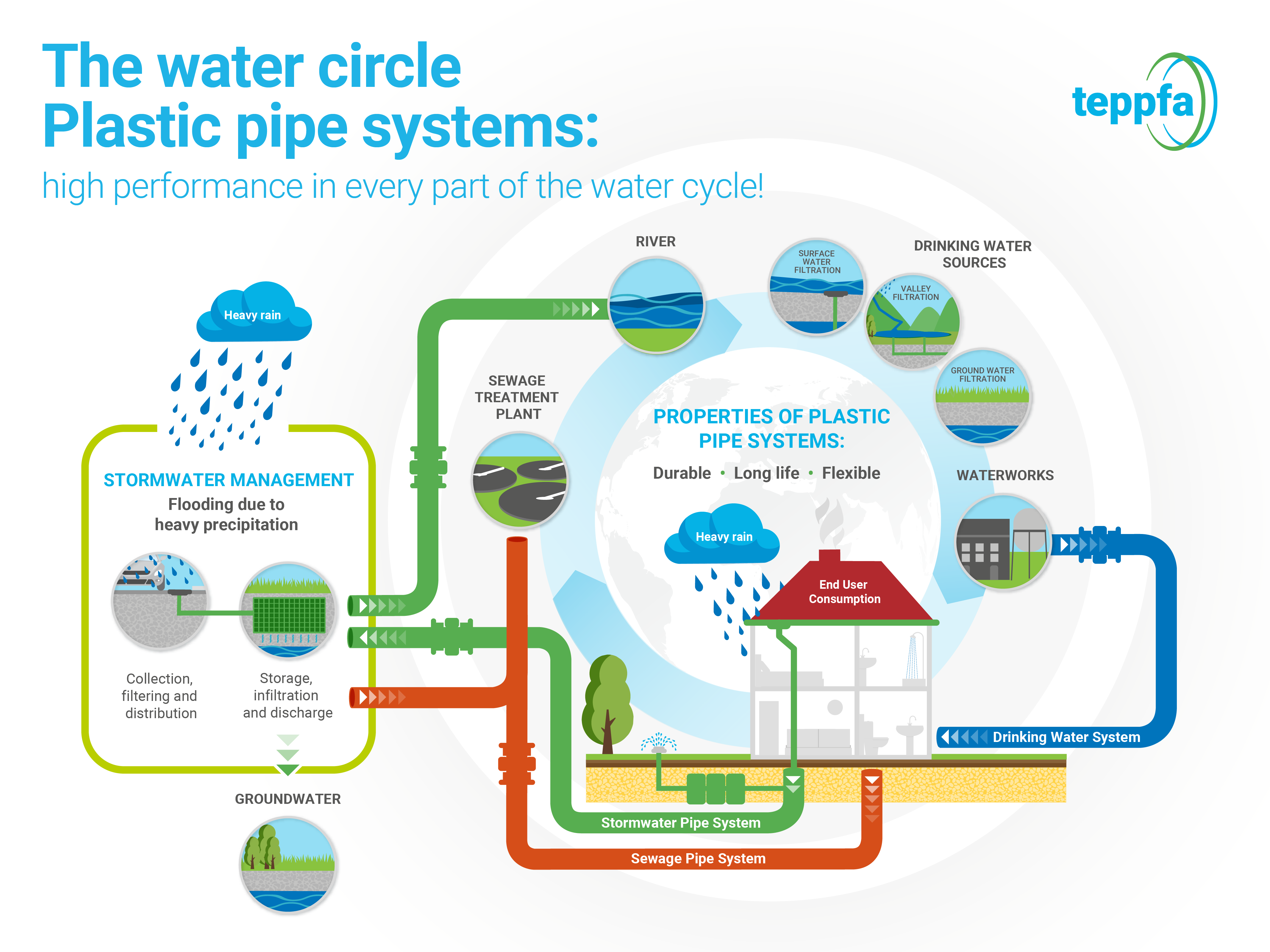
Water is essential for life and we have to manage it more efficiently to secure a good water supply to people and nature.
Polymer pipe systems have become indispensable in the water cycle, we meet them everywhere: in the production and distribution of drinking water, the conveyance of waste water, as well as the collection, retention, infiltration and discharge of rainwater. Innovative systems offered by the polymer pipe industry contribute significantly to a better quality of life and sustainable water management. Interact with TEPPFA infographic here to find out more on the contribution of polymer pipe systems to the water cycle.
Drinking water supply
Whether at home or in the office, the supply of clean drinking water is essential. Millions of households, businesses and public institutions trust that the water coming out of the tap meets the highest quality standards. That is why the recent revision of the European Drinking Water Directive, aimed at allowing access to safe drinking water for all, is so important.
Drinking water is increasingly being exposed to pollution, coming from harmful substances that enter and contaminate the stream. Moreover, an outdated and often leaking sewer infrastructure can lead to impairments in water quality.
Modern polymer pipe systems ensure that high-quality drinking water safely reaches the end consumers. Polymer pipe systems do not rust, and do not change the taste, smell or colour of the drinking water being transported through them. Due to their numerous benefits, polymer pipe systems support the municipalities and utility companies by delivering outstanding performance at every point of the water cycle. Making cities inclusive, safe, resilient and sustainable is the central principle of the United Nations Sustainable Development Goal 11.
Clean water and sanitation for all
The COVID-19 pandemic has demonstrated the critical importance of sanitation, hygiene and adequate access to clean water for preventing and containing diseases. According to the World Health Organisation, handwashing is one of the most effective actions you can take to reduce the spread of pathogens and prevent infections, including the COVID-19 virus. Availability and access to water, sanitation and hygiene is at the core of United Nations Sustainable Development Goal 6.
A sewage discharge that meets the highest standards is not a luxury, but an essential component of public services. The wastewater that flows through sewage pipes towards the sewage treatment plant contains water that was used for washing hands, showering, wastewater from the washing machine, and wastewater containing faeces. It is therefore paramount that the wastewater reaches the sewage treatment plant without any impedance or spillage. At the same time, a considerable portion of sewer networks are outdated, causing leakages. This poses considerable risks which should not be underestimated for people and the environment. Plastic pipe systems offer safe and innovative solutions to quickly and effectively renovate the existing sewage networks.
Climate change adaptation
Flooding due to heavy precipitation in the North and drought due to heat waves in the South are causing additional struggles within the European municipalities. Mitigation of the consequences of climate change can lead to an overload of the existing piping systems. The consequences can be dire with water pollution and even endangerment of drinking water. United Nations Sustainable Development Goal 13 urges us to take action to combat climate change and its impacts.
Decentralised rainwater management – often using polymer pipe systems – can help to reduce the pressure. One option is not to simply divert rainwater into sewers, but to store it for gardening. Alternatively, the water seeps away directly on site and is thus fed slowly into the groundwater. In this way, necessary new sewer structures can be dimensioned with smaller pipe diameters to be more cost-effective.
Efficient and sustainable rainwater management largely depends on the controlled drainage of rainwater by the use of such structures as infiltration crates. The polymer pipe industry with its systems supports municipalities in efficient rainwater harvesting and sustainable rainwater management, which reduces loads on stormwater pipe systems and prevents land subsidence. This controlled discharge is of the utmost importance for flood protection of sewer networks.
Interact with TEPPFA infographic here to find out more on the contribution of polymer pipe systems to the circularity of water.
Posted in support of World Water Day.
ENDS


